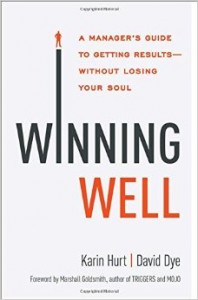 Several years ago at a party, I was approached by a young man who had just assumed his first management job. His name was Carl and he had a simple question: “Is there any company I can go to where I don’t have to choose between getting good results and treating people right?”
Several years ago at a party, I was approached by a young man who had just assumed his first management job. His name was Carl and he had a simple question: “Is there any company I can go to where I don’t have to choose between getting good results and treating people right?”
I answered Carl’s question with one of my own: “Why not stay where you are and do the job right?” I told him what I learned in the Marines, that you really have two jobs. One is to accomplish the mission, make your numbers in business. The other is to care for your people, keep them safe and help them grow.
It can be done. There are managers all over the world doing it every day. Carl and I talked some more. I tried to give him the basics of doing it right. If we were having that conversation today, I’d suggest that Carl read Winning Well.
An Overview of Winning Well
The promise of the book is in the full title: Winning Well: A Manager’s Guide to Getting Results–Without Losing Your Soul. Karin Hurt and David Dye have written a book that goes way beyond my discussion with Carl. Here’s the premise of the book, taken from chapter one.
“Winning Well means that you sustain excellent performance over time, because you refuse to succumb to harsh, stress-inducing shortcuts that temporarily scare people into ‘performing.’ You need energized, motivated people all working together. Your strategy is only as strong as the ability of your people to execute at the front line, and if they’re too scared or tired to think, they won’t. You can have all the great plans, six sigma quality programs, and brilliant competitive positioning in the universe, but if the human beings doing the real work lack the competence, confidence, and creativity to pull it off, you’re finished.”
The book is divided into four sections. The first covers the basics of Winning Well. Section two is about accomplishing the mission, getting the job done. Section three is about caring for the people, covering how you “Motivate, Energize, and Inspire Your Team.” The fourth and final section is practical advice for getting started, even if your boss doesn’t care about your soul or your team doesn’t care about the work or each other.
Who Should Not Read Winning Well
There are people who believe that all of this caring for the people stuff is nonsense. If that’s you, don’t even bother to pick up Winning Well. Wait until you think there might be something to the caring part of being a manager, then, when you’re looking for the “how to do it” part, buy the book and read it.
Who Should Read Winning Well
You should read Winning Well if you want practical advice for the real problems of getting results without losing your soul. Here are three kinds of people who can benefit from this book.
If you’re a working manager
If you’re a working manager and you want to learn the how’s of Winning Well, you can use this book in two ways. Read it straight through, making notes as you go. Then create an action plan for becoming the manager you want to be. There’s plenty of help in the book and online.
You can also read individual chapters to help you with a thorny issue at work. Dip into the book, get some just-in-time learning, and meet the specific challenge you’re facing today.
If you are a leader of managers
You’ll get a lot from this book and it’s also a great book to share with your managers. Winning Well is about rich, long term success. This would be a great book to stimulate discussion at team meetings or for a book club.
If you think you might want to be a manager
If you’re considering becoming a manager, Winning Well can help you in two ways. You’ll learn how you can be the kind of boss who gets results and builds relationships. As a bonus, the many stories and examples will give you insight into what a manager’s job is all about.
Bottom Line
If you’re a manager who wants to get great results and still have a good relationship with your people, or if you want to become that kind of manager, Winning Well will give you the insight, information, and inspiration to achieve those goals.
You can find out more about this book and how it got written by reading The Story of Winning Well on my writing site.

